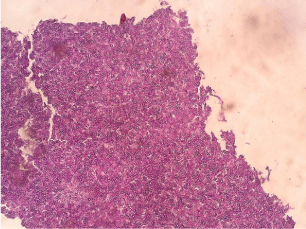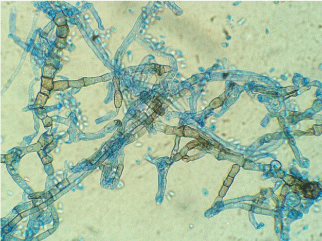
Clinical Image
Austin J Microbiol. 2017; 3(1): 1014.
Histopathological Features of Epicoccum nigrum Rhinosinusitis
D’Aleo F*, Bonanno R and Bianco G
Associated Study of Forensic Microbiology, Italy
*Corresponding author: Francesco D’Aleo, Associated Study of Forensic Microbiology via Augusta Pellaro, 89134 Reggio Calabria, Italy
Received: May 04, 2017; Accepted: May 11, 2017; Published: May 22, 2017
Keywords
Maxillary sinus; Rhinosinusitis; Epicoccum nigrum
Clinical Image
A 73 year-old man has come to clinical attention with a maxillary sinuses swelling. Clinical diagnosis of acute or chronic sinusitis along with pansinusitis was made. Biopsy for histopathological and microbiological examination was performed.
We report two images of rhinosinusitis due to Epicoccum nigrum. The term rhinosinusitis is referred to a group of disorders characterized by inflammation of the nasal mucosa and paranasal sinuses.
First image shows the histopathological examination features of the biopsy with Hematoxylin/Eosin stain (Figure 1). The hyphae appeared with thicker cell walls with regular septa and distorted the appearance of maxillary sinus tissues.
Second image shows microscopic features of Epicoccum nigrum isolated by culture medium (Figure 2). Its hyphae have parallel walls, irregular branching, and septa. They are dark yellow or brown when unstained or poorly stained. Conidia are formed singly and globose to pyriform mostly 15-25μm diameter.

Figure 1: The histopathological examination features of the biopsy with
Hematoxylin/Eosin stain.
